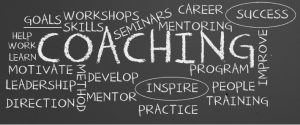Coaching has proven to be one of the most powerful ways we can develop our leaders. It is a completely personalised development activity which can deliver increased understanding, improved performance, greater insight and lasting change. It creates a supportive environment that can develop your critical thinking skills, new ideas and approaches and most frequently enhances behaviours.
So how does it work?
Coaching is done in real time, in a one-to-one context with a qualified coach that has been selected for you, the individual leader, taking into account your development needs and preferences for learning.

Normally we agree a series of 6 one-hour sessions around a series of coaching objectives. Performance improvements are measured at the end of what is typically a 9-12 month coaching programme. It’s not easy. The focus is on you and you are challenged and required at times, to think about things from different perspectives and to try new approaches. It is all done in a confidential environment and leaders should feel safe to share their concerns, fears and of course try out new strategies and approaches.
Broadly we talk about two types of coaching:
- Skills Coaching – to help you the leader, to develop a new functional competence e.g. making a presentation to a high profile audience, writing a faculty plan or reading a financial report for the first time.
- Transformational Coaching – where the coach helps the individual to find a workable approach to a new challenge e.g. engaging staff to produce a vision for the academic unit, working better with challenging colleagues, pulling away from operational work , stepping into a more strategic arena etc.

Leaders find they often benefit from coaching when they are making a career transition from one key role to another. They appreciate the objective “sounding board” that coaching can offer.
Read more about leaders’ personal experiences of coaching at
http://www.ncl.ac.uk/staffdev/leadership/coaching/experiences.htm
Lynne Howlett, Assistant Director of HR (Leadership Talent)
